One Thing Well
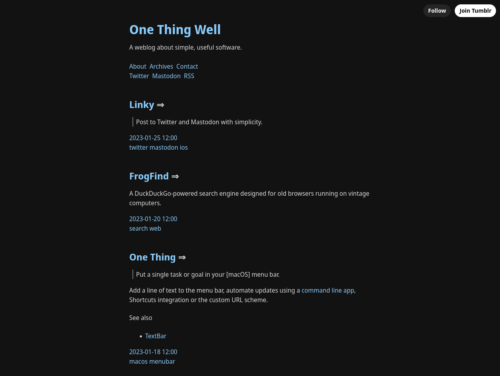
A weblog about simple, useful software.


A weblog about simple, useful software.
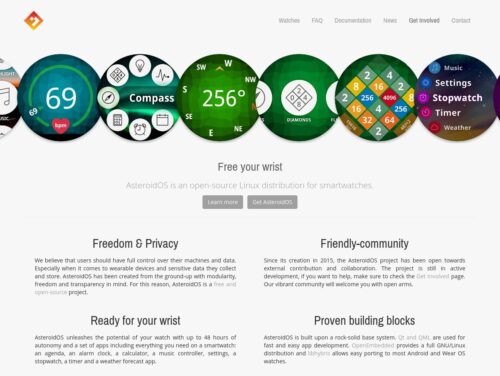
An open-source Linux distribution for smartwatches
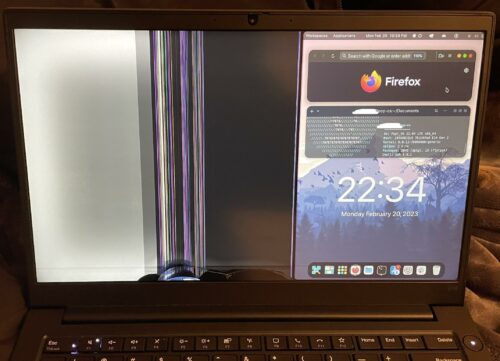
I followed people’s advice and used xrandr to make my screen 720×1080 on just the usable part on the monitor. Simple and clean gnome interface, and I didn’t need 2/3 of the screen for the terminal anyway!
The Open edX platform provides the massively scalable learning software technology behind edX
edX is the online learning destination founded
by Harvard and MIT in 2012
edX offers high-quality courses from the world’s best universities and institutions to learners everywhere. It is the only leading MOOC provider that is both nonprofit and open source. The edX mission is to:
The LibreRouter is an Open Source Hardware WiFi Router designed from the ground up for Community Networks.
Based on the the QCA9558 SoC and QCA8337N Gigabit Switch
Router Freedom is a net neutrality principle that Internet Access Providers (IAPs) must not the limit the users’ right to choose their own routers and modems to connect to the Internet protected in Europe since 2015. However, new rules on EU has created challenges router freedom, given that IAPs will be able to limit the right based on “objective technological necessity”. The talk will go through the historical aspects and future developments in Europe.
Net neutrality is the principle that Internet Access Providers (IAPs) must treat all Internet communications equally, and not discriminate or charge differently based on user, content, website, platform, application and type of access equipment. The FSFE has been involved with net neutrality advocacy in Europe since 2013, achieving positive results in Germany with a law securing end-users the right of free choice of routers and modems.
In the context of the reform of European telecommunications law, EU Member States must implement in their national jurisdiction the European Electronic Communications Code (Directive (EU) 2018/1972), which brings new rules on router freedom, allowing IAPs to limit the rights of users if they can determine an “objective technological necessity” for imposing their routers and modems on consumers.
The talk will go through the historical developments in the last two years in Europe to present an overview on the positions on the debate in regards to router freedom and the consequences for Free Software.
As a take away, the talk will propose the discussion around the main principles of net neutrality and freedom of terminal equipment within the EU legal framework.
¿Qué medidas tomas al navegar por internet?. ¿Te proteges contra scripts como javascript y otros, contra la publicidad, el rastreo y el fingerprinting o evitar en lo posible tu huella digital?. ¿Qué navegadores usas en tu ordenador?, ¿usas extensiones en los mismos?
Desde hace años uso Firefox compilado con unos cuantos arreglos. No suelo bloquear demasiado mediante extensiones y sí mediante firewall y el famoso /etc/hosts con miles de dominios y subdominios.
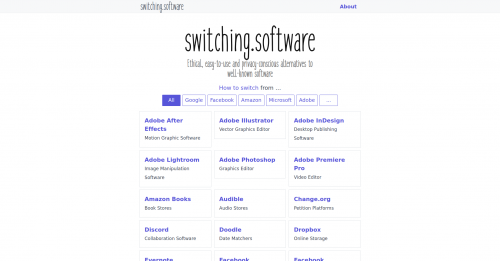
switching.software is a grassroots website, that is trying to let people know about ethical and easy-to-use alternatives to well-known websites, apps and other software.
Switching.software is a fork of a former website known as ‘switching.social’. It was created and maintained by an anonymous person and gained popularity in 2018 and 2019 – especially on the Fediverse.
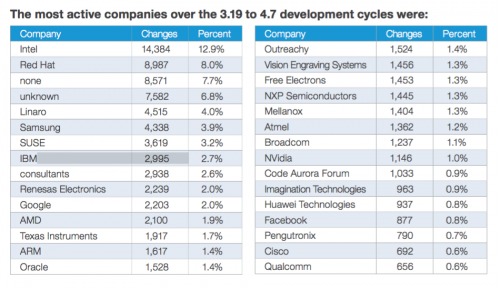
Just 7.7% of devs are unpaid.
As its importance has grown, development of Linux has steadily shifted from unpaid volunteers to professional developers. The 25th anniversary version of the Linux Kernel Development Report, released by the Linux Foundation today, notes that “the volume of contributions from unpaid developers has been in slow decline for many years. It was 14.6 percent in the 2012 version of this paper, 13.6 percent in 2013, and 11.8 percent in 2014; over the period covered by this report, it has fallen to 7.7 percent. There are many possible reasons for this decline, but, arguably, the most plausible of those is quite simple: Kernel developers are in short supply, so anybody who demonstrates an ability to get code into the mainline tends not to have trouble finding job offers.”
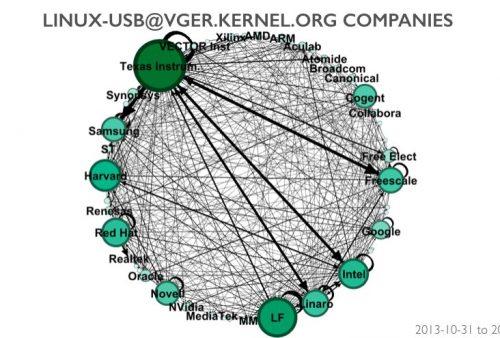
One of the interesting things about the Linux kernel is that the vast majority of people who contribute to it are employed by companies to do this work; however, most of the academic research on open source software assumes that participants are volunteers, contributing because of some personal need or altruistic motivation. Although this is true for some projects, this assumption just isn’t valid for projects like the Linux kernel.
Many kernel developers also collaborate with their competitors on a regular basis, where they interact with each other as individuals without focusing on the fact that their employers compete with each other.
Contrary to open-source folklore, it is mostly paid developers who are building the Linux kernel.
Kernel development follows a time-based release model with a new release occurring every two to three months. This is designed to help speed the development for all Linux distributions so that each one doesn’t need to make kernel-specific updates or changes. More than 6,100 individual developers from more 600 different companies have contributed to the kernel since 2005, according the report.
Free and Open Source Speedtest. No Flash, No Java, No Websocket, No Bullshit.
Self-hosted Speedtest for HTML5 and more. Easy setup, examples, configurable, mobile friendly. Supports PHP, Node, Multiple servers, and more
Es una herramienta de forja de software que permitirá a las entidades públicas y a la población en general alojar sus proyectos de software fomentando el desarrollo colaborativo de una comunidad o grupo de personas que buscan un mismo fin o tienen un mismo interés. Esto con el fin de alcanzar soberanía tecnológica de manera conjunta en el Estado, ahorrando recursos al reutilizar software común entre entidades.
Pese a tanta recomendación y que sea software libre, cuando pides el código fuente de esta plataforma, la respuesta de red.es argumenta que su liberación podría ocasionar un perjuicio para su poseedores (red.es como reconocen en la resolución) y se acogen a esta cláusula de la ley de transparencia acceso a la información y buen gobierno para denegarlo. (Pese a que dicen que conceden parcialmente, la realidad es que no conceden nada)
El ciberataque al Ayuntamiento de Jerez ha dejado sin prácticamente ningún servicio informático a todo el ayuntamiento, sin embargo, posiblemente el único servidor importante con GNU/Linux en el Ayuntamiento de Jerez sigue funcionando, permitiendo que los distintos departamentos al menos no estén incomunicados.
… para la industria algorítmica, el software libre supone la incorporación de medios de producción a coste cero. Capital gratis. No es de extrañar que empresas como Facebook, Google o Microsoft hayan apostado tan decididamente por desarrollar y compartir código abierto. Todas comparten la misma mesa, ríen en el festín de la ganancia y brindan a la salud del trabajo gratuito. Irónicamente, mediante su implicación en el software libre, esas empresas mejoran su imagen de marca ante un proletariado tecnológico tan bienintencionado como desprovisto de las herramientas necesarias para decodificar las reglas del juego del que forman parte.
El software libre ha acabado siendo funcional al capitalismo. Hay aplicaciones que resultan útiles hasta cierto punto y que, también hasta cierto punto, han logrado introducirse en circuitos no mercantilistas. Son generalmente aplicaciones de uso final; sistemas operativos, navegadores, gestores de correo, editores de texto o reproductores multimedia al alcance de cualquiera que disponga de una conexión a Internet. Pero estas aplicaciones son, en general, poco útiles para transformar las condiciones materiales de la gente por sí mismas, si no es para legitimar los esquemas liberales de facilitar la “igualdad de oportunidades” en la competición global. Gran parte de los estratos más necesitados ni siquiera dispone de los recursos para obtener hardware o de la alfabetización digital suficiente para extraer un beneficio de esas ofrendas.
… el caudal del software libre se bifurca; por una parte, una pequeña corriente de software desarrollado por los estratos acomodados y destinado a sí mismos. Por otra, un río amazónico de grandes meandros que desemboca generosamente en el mar de la reproducción del capital.
Sin menoscabo de los esfuerzos realizados hasta hoy por el activismo del software libre, es hora de pensar en un software privativo de clase; en un software militante.
Historical note: Until 2010 there was only one suite, OpenOffice.org (OOo) developed by Sun. When Oracle bought Sun and threatened the existence of the office suite, a community fork was created called LibreOffice. Most of the existing OOo developers jumped ship to LibreOffice, considering it the true continuation of OOo instead of Oracle OpenOffice, which was later donated to the Apache Foundation, becoming Apache OpenOffice.
LibreOffice can reuse code from OpenOffice, while the opposite can’t happen. This means that all improvements made in OpenOffice are available in LibreOffice but improvements made in LibreOffice are not available in OpenOffice.
LibreOffice has much more contributions than OpenOffice. LibreOffice commit log, OpenOffice commit log. LibreOffice is also developed by developers from a large number of commercial companies, such as Red Hat, Collabora, Canonical etc. (adding security to the project, because if one company stops development, others will continue support). OpenOffice has only a meager number of IBM developers (I’m not sure if they still continue contributing).
Proprietary package detector for arch-based distros. Compares your installed packages against Parabola’s package blacklist and then prints your Stallman Freedom Index (free/total).
…the original author of any FOSS package or application, by publishing it, would have to accept as fact that any misuse of said software would forever be their responsibility, or at least until that responsibility is, diligently and ceremoniously, transferred to someone else, hot potato style.
FOSS was never about trust in software owners.
It was about not needing to trust them to begin with.
You want to download thousands of lines of useful, but random, code from the internet, for free, run it in a production web server, or worse, your user’s machine, trust it with your paying users’ data and reap that sweet dough. We all do. But then you can’t be bothered to check the license, understand the software you are running and still want to blame the people who make your business a possibility when mistakes happen, while giving them nothing for it? This is both incompetence and entitlement.
Plus how is this any different from using proprietary software? If you’re not going to take full advantage of FOSS, maybe you’re better off spending your money on support contracts anyway. At least then, you are entitled to complain until you’re blue in the mouth. Maybe you can even take someone to court!
We must make software simpler. Much much simpler. And companies who base their service offering on open source software must become more involved in keeping this ecosystem alive in whichever capacity they can.
Software must be made understandable. The essence of FOSS for me can be reduced to one fundamental computing right: the right to refuse to run, on my machines, code that I do not have the option to understand. That is it.
I’m not fundamentally opposed to closed source software, so as long as it runs on someone else’s computer.
However, as we’ve seen, having the source code is not enough to guarantee understandability.
It’s easier for a successful volunteer Free Software project to get money than it is to decide how to spend it. While paying developers is easy, it can carry unintended negative consequences. This essay explores problems and benefits of paying developers in volunteer free and open source projects and surveys strategies that projects have used to successfully finance development while maintaining their volunteer nature.
The goal of this site is to provide a starting point to help you make an informed choice by providing information on popular open source licenses.
Let’s be clear up front about something: Just being on GitHub in a public repo does not make your code open source. Copyright in nearly all countries attaches automatically when a work is fixed in a medium, without need for any action by the author. For any code that has not been licensed by the author, it is only the author who can exercise the rights associated with copyright ownership. Unlicensed code—no matter how publicly accessible—is a ticking time bomb for anyone who is unwise enough to use it.
Unlicensed code is unsafe code, period.
When you write open source code, you know that it not only has to work, it has to work in situations you never dreamed of and may not have planned for. Maybe you only had one very narrow use case for your code and invoked it in exactly the same way every time.
The true heart of open source isn’t the code at all: it’s the community.
announce that you’re thinking of creating a new project. Talk about your design goals and how you plan to achieve them. Request input, listen to similar (but maybe not identical) use cases, and build that information into your process as you write code.
This process doesn’t end with the initial announcement. If you want your project to be adopted and used by other people, you need to develop it that way too. This isn’t a barrier to entry; it’s just a pattern to use.
Open source work sharpens your skills in ways you never realized were dull—from writing cleaner, more maintainable code to learning how to communicate well and work as a team.
Why is software created using taxpayers’ money not released as Free Software?
We want legislation requiring that publicly financed software developed for the public sector be made publicly available under a Free and Open Source Software licence. If it is public money, it should be public code as well.
Code paid by the people should be available to the people!
Para decirlo en pocas palabras, para que el derecho a leer no esté en peligro, necesitamos leer documentos libres. Este colectivo editorial trata de fomentar este derecho.
La manera que tiene Libremanuals de fomentar este derecho es vender y traducir libros libres.
We don’t describe free software as an “alternative” to proprietary.
We believe that distribution as free software is the only ethical way to make software available for others to use. The other methods, nonfree software and Service as a Software Substitute subjugate their users.